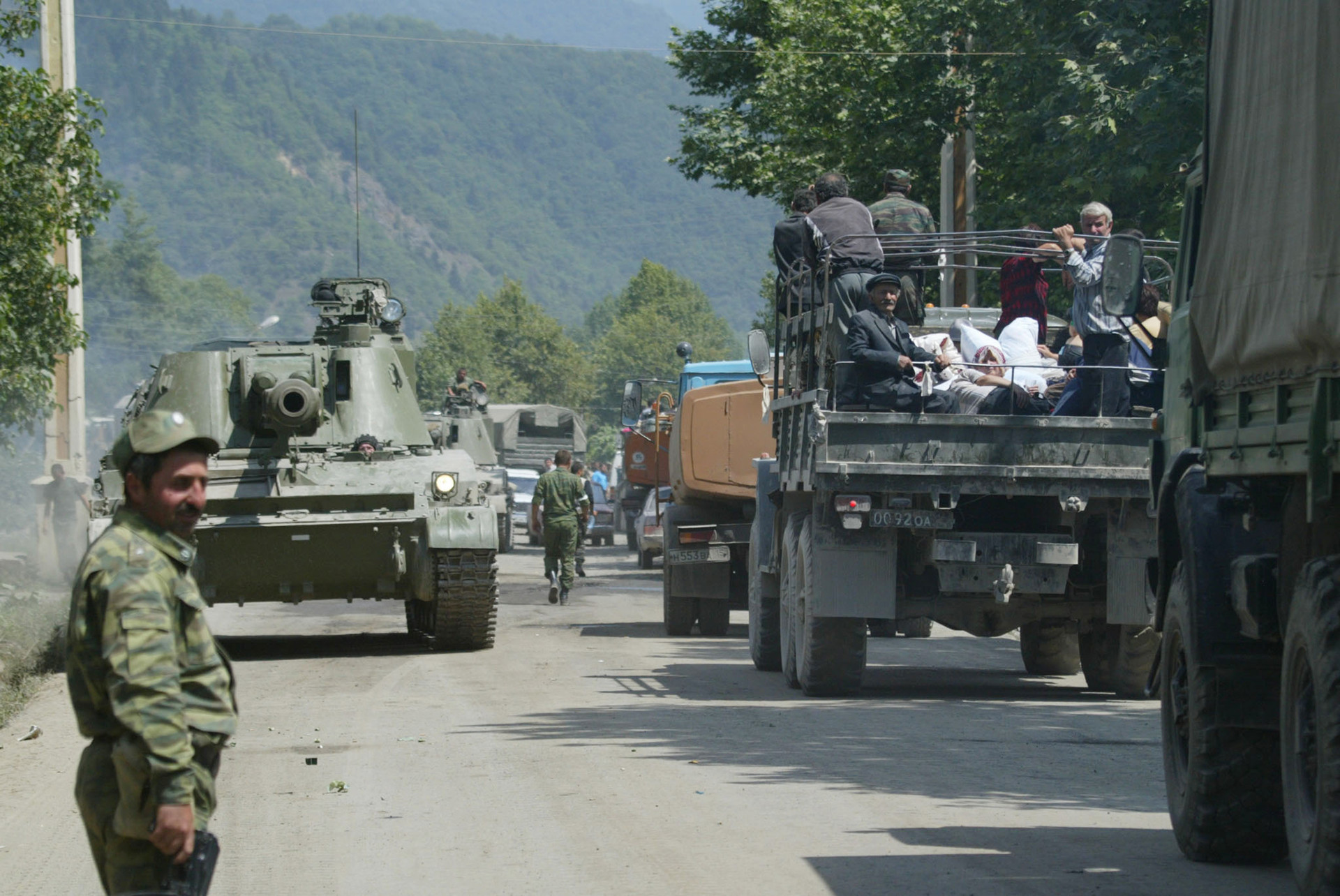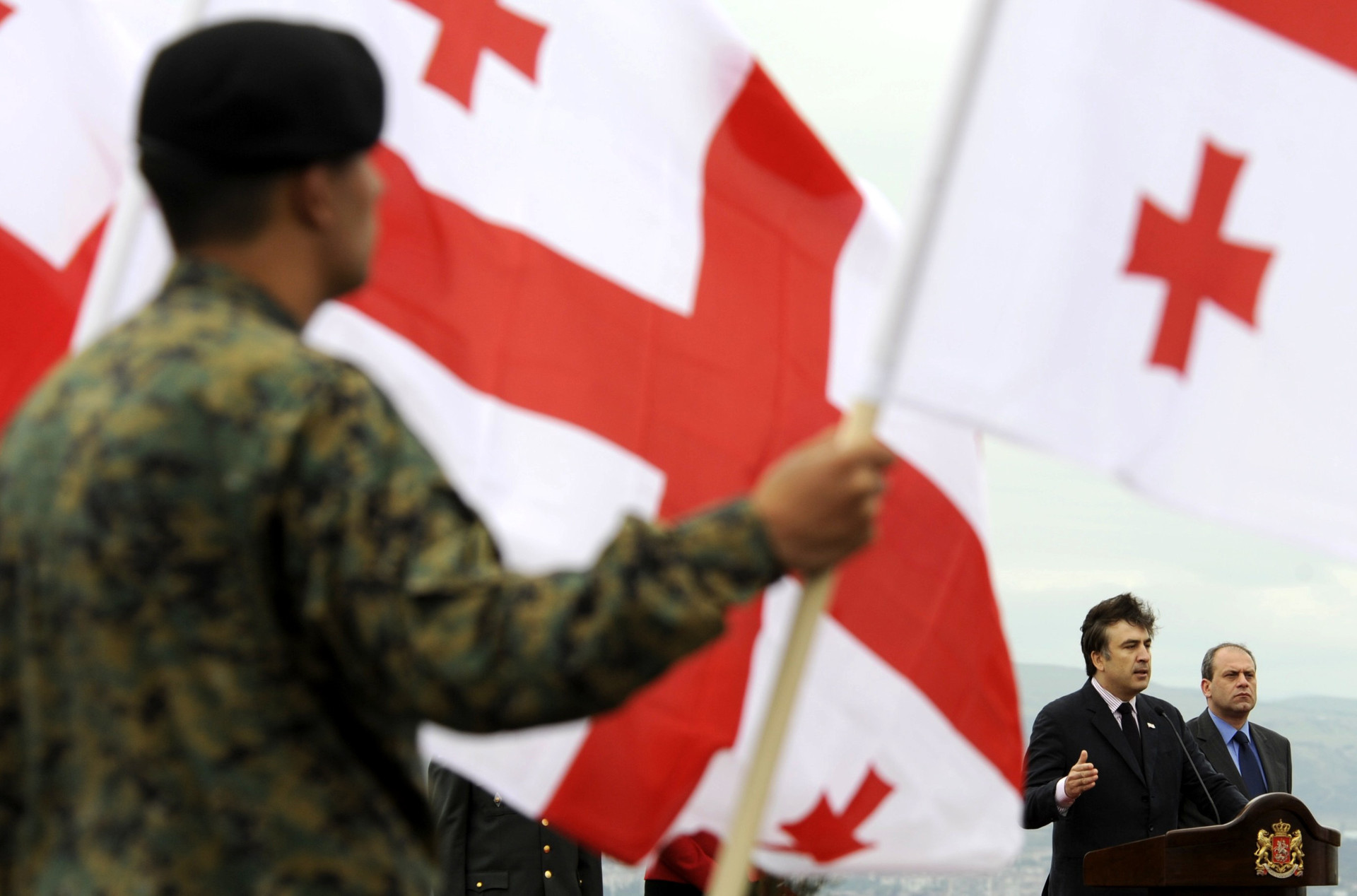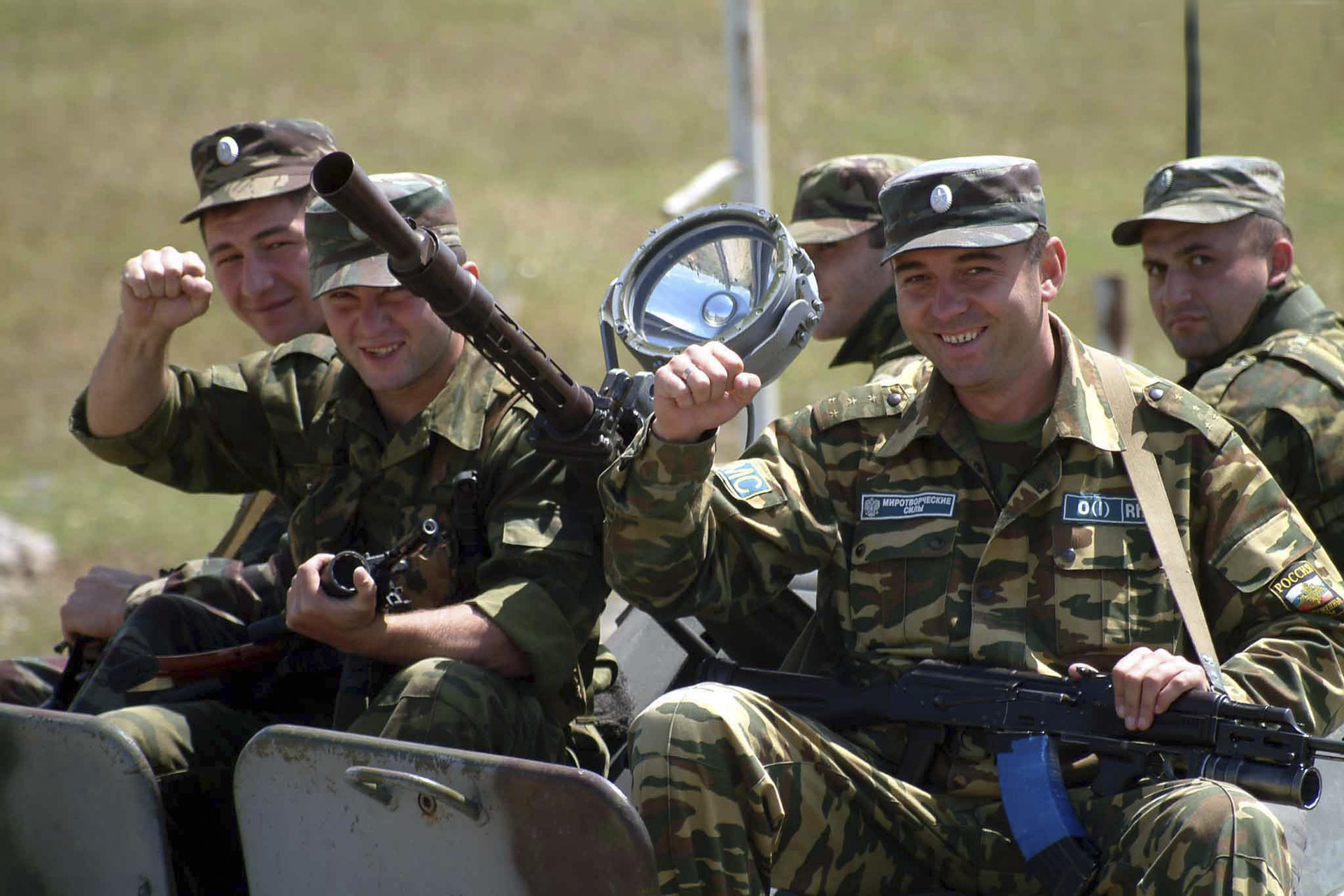The five-day war in August 2008 led to serious changes in Transcaucasia. Russia, having conducted an operation to enforce peace and protect peacekeepers and its own citizens (most of the residents of the republic had Russian passports), recognized the independence of South Ossetia and Abkhazia and increased its military presence in the republics. In response, Tbilisi severed diplomatic relations with Moscow.
Despite numerous evidence of the aggressive nature of the operation of the Georgian Armed Forces, Tbilisi continues to reject accusations of assault. The Georgian leadership perceives Moscow's policy towards Abkhazia and South Ossetia as "occupation" and "trampling all international norms."
However, the fact of the Georgian aggression was confirmed in the report of the international commission to investigate the causes of the conflict in the Caucasus, created by the EU. The document was published in the autumn of 2009.
From provocations to war
The situation around South Ossetia has been consistently heated since 2006. Georgian President Mikheil Saakashvili tried to press Moscow, demanding to withdraw from the territory of the country the remaining parts of the USSR, and repeatedly expressed dissatisfaction with the lack of control over the two autonomous republics.
"There can hardly be any doubt that Saakashvili was methodically preparing to throw himself into South Ossetia. He made a lot of efforts to strengthen the army and to achieve early withdrawal of Russian troops in 2007, "Professor of the Academy of Military Sciences Vadim Kozyulin said in an interview with RT.
Active armed provocations on the demarcation line, where Russian peacekeepers were stationed, began in July 2008. In early August, Georgian troops from grenade launchers and mortars fired several times at Tskhinval and Ossetian villages.
On August 7 at 14:00 the Georgian peacekeepers left their positions. A few hours later, the Russian "blue helmets" recorded the movement of heavy Georgian equipment and trucks to the border of South Ossetia. Ossetian militiamen claim that on August 7 the Georgian Armed Forces fired at using large-caliber guns.
The Georgian soldiers crossed the line of demarcation on the night of August 8 and entered Tskhinval early in the morning. Fire support was provided to the aggressor by tanks, Su-25 attack aircraft and artillery systems, including the BM-21 Grad. The positions of Russian peacekeepers and militia, as well as residential quarters, were subjected to shelling.
The network produced footage shot by Georgian soldiers. They show how the troops entering the city are firing on civil vehicles and houses. There is no exact information about the casualties among civilians. According to the South Ossetian authorities, about 2 thousand people were killed under shelling.
The peacekeepers and militia units gave rebuff to the aggressor for two days. The main striking force of Russia became parts of the 58th combined arms army. In the afternoon of August 9, they entered the battle with the Georgian Armed Forces, the main Russian forces were pulled up on the morning of August 10.

- Russian servicemen sent to Tskhinvali
- RIA News
The entry of Russian troops was a turning point in the conflict. The Georgian army began a hasty and unorganized retreat. This is eloquently evidenced by the statistics of the Georgian losses. Trophies of the 58th Army are more than 60% of the military equipment of the occupiers.
On August 11, Russian troops crossed the border in order to destroy the enemy's military infrastructure, which was involved in the operation. Strikes were inflicted on control points, radar stations, warehouses with weapons.
Georgian troops did not resist. They left the town of Gori and a number of settlements. The forward units of the 58th Army advanced forward 35 km from Tbilisi, which caused a great stir in Georgia and the West.
August 12, Russia completed the operation against the Georgian troops. On August 16, Russian President Dmitry Medvedev and French President Nicolas Sarkozy signed a peace plan. In October, Russian troops were withdrawn from the territory of Georgia.
"The inevitability of escalation"
The Russian authorities did not hide that they had information about Georgia's preparations for an armed rally against one of the unrecognized republics. In August 2012, Russian President Vladimir Putin said that the plan to repel the Georgian aggression was drawn up in 2006-2007.
As the former commander of the Airborne Forces Vladimir Shamanov recalled, the military leadership assumed that the offensive of the Georgian army would begin on time from July to September. At the same time, the Ministry of Defense did not expect that a blow to South Ossetia would be inflicted during the Summer Olympics in China.
On the night of August 8, Prime Minister Vladimir Putin was in Beijing, where the OI-2008 opened, and President Dmitry Medvedev was resting on the Volga. Defense Minister Anatoly Serdyukov also was not in Moscow. As a result, the head of state gave the order on the introduction of troops into South Ossetia.
"Understanding the inevitability of escalation was present, but in a sense, the leadership of Russia was taken by surprise. According to the ancient unwritten tradition, during the Olympics, wars ceased. Probably, such cynical perfidy really did not expect - and from this point of view, Saakashvili chose a very convenient moment, "stated Kozyulin.
According to the expert, Tbilisi could not fail to take into account the factor of the large-scale military reform that began in 2007, accompanied by structural changes in the Russian army. In this regard, according to Kozyulin, in 2008 the Russian Armed Forces had some "childhood illnesses".
"As of July-August, not all of the equipment deployed in the south of the units was in good order. This affected the mobilization opportunities. In addition, because of the reform, the management system was not adjusted, "Kozyulin described the situation.
During the peace enforcement operation, the Russian Armed Forces lost 67 servicemen, including ten peacekeepers, four combat aircraft, three tanks, and about 20 armored vehicles and trucks. According to various sources, Georgian troops lost from 170 to 3 thousand people, three helicopters, three planes, two combat boats, dozens of tanks and armored cars.
"The Georgian army was not toothless. Georgia was armed with sufficiently effective air defense systems, drones, modern means of communication and control. On the Georgian soldiers was a convenient outfit, "- said Kozyulin.
Georgia actively bought weapons in Ukraine and Israel. In particular, Kiev helped Tbilisi restore artillery and air defense capability, and Tel Aviv delivered rocket launchers LAR-160 and UAV. The US did not sell lethal weapons to Georgia, preferring to supply its army with ammunition, communications and all kinds of equipment.
Speaking at the Valdai Forum in 2008, Vladimir Putin said that American instructors were training the Georgian troops. According to experts, in total, the US spent about $ 1.5 billion on military assistance to Tbilisi.

- Saakashvili opens memorial to Georgian soldiers killed in August 2008
- Reuters
Kozyulin stressed that the five-day war served as a stimulus for the improvement of the Russian army. The South Ossetian conflict, like any real fighting, made it possible to identify and correct the weaknesses of the armed forces.
"Russia has realized the danger that local conflicts represent. First of all aviation was subjected to modernization. Also, the troops began to receive drones, without which reconnaissance is impossible in the modern theater of military operations. Mobile capabilities of the units have significantly increased. The equipment of servicemen has radically changed, "the expert said.
"Silence on the air"
In the West, the conflict in South Ossetia caused criticism of Russia. Foreign politicians and the media ignored the initial phase of the five-day war, when Georgian troops have not yet collided with the Russian army.
After the retreat in the West, they tried to present the South Ossetian conflict as an invasion of the Russian army with the aim of encroaching on the territorial integrity of Georgia.
"In the second half of the day on the 7th, it all began, and only on the night of the 9th our troops approached Tskhinval. I was in Beijing, watching the world media. And you know, complete silence on the air. As if nothing happens at all. As a team, "Putin commented on the behavior of Western journalists at the 2008 Valdai Forum.
According to the Russian leader, in the West they again did not want to perceive a real picture of events. Putin also said that Russia had no choice but to protect peacekeepers and the civilian population of South Ossetia.
The Ministry of Foreign Affairs of the Russian Federation considers that the operation on compulsion to peace was legal and corresponded to the 51st article of the UN Charter regulating the right to individual or collective self-defense.
"The Russian military operation pursued the only goal - to stop the aggression of Georgia and prevent the possibility of repeated attacks. Its organization and conduct were strictly proportional to the threat posed by Georgia. Upon completion of the military operation, the units of the Armed Forces of the Russian Federation were withdrawn from the territory of Georgia in October 2008, "the statement of the Foreign Ministry said, timed to the tenth anniversary of the August events.
The Russian Foreign Ministry stressed that recognizing South Ossetia and Abkhazia, the Russian Federation took responsibility for their security and successful establishment as modern, democratic, socially and economically prosperous countries.
"On September 9, 2008, diplomatic relations were established with the two republics, and on September 17, 2008, friendship, cooperation and mutual assistance agreements were signed, which became the cornerstone of our active cooperation," the ministry noted.

- Russian peacekeepers in Tskhinvali
- RIA News
In a conversation with RT, Andrei Areshev, a researcher at the Center for the Study of Central Asia and the Caucasus of the Institute of Oriental Studies of the Russian Academy of Sciences, said that the adventure of Saakashvili and the support of his aggressive initiatives by the US led to a five-day war.
"With the advent of Saakashvili, Georgia fell into the orbit of Washington's influence. The eccentric president, the Americans pushed for the conflict, but did not promise help after Russia retaliated. This is a manifestation of a typical US policy toward its satellites, "Areshev said.
The expert stated that Washington and Georgian "patriotic" propaganda managed to sow seeds of enmity between the two states. At the same time, he believes that over the past ten years, Russia and Georgia have become much closer in economic and humanitarian spheres.
"The situation around Abkhazia and South Ossetia is a very painful issue for the Georgian national self-consciousness. Politically, the situation from the dead point will not move. However, this does not mean that a compromise can not be found between looking to the future by individual statesmen, businessmen and ordinary citizens, "Areshev summed up.
